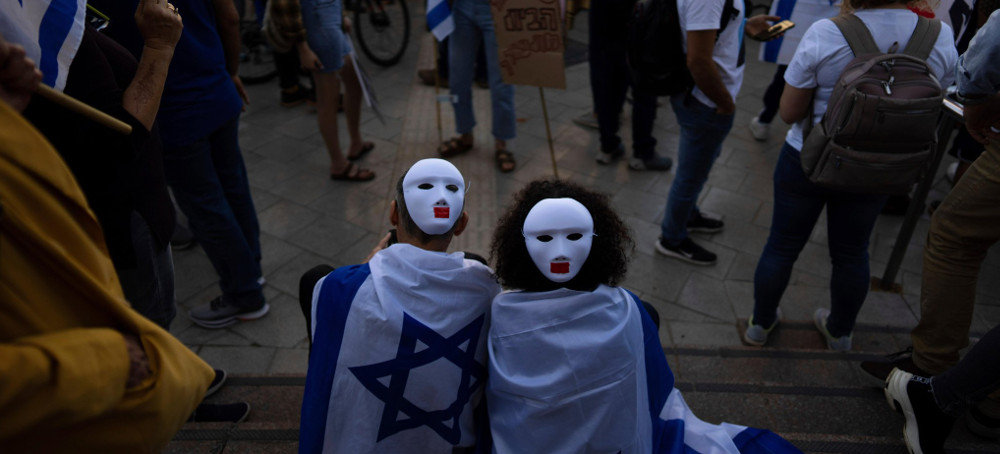Live on the homepage now!
Reader Supported News
The protest movement will either transform into a call for genuine democracy – for Palestinians and Israelis alike – or it will remain locked in the current impasse
That is the place where the protests against the Netanyahu government’s plan to strip the judiciary of its power stand right now. Last week saw street demonstrations of a size and intensity never seen before in Israel. It was, largely, a revolt of the educated and the middle class – of self-identified liberal, secular Israel against authoritarian, theocratic Israel. One of the movement’s most prominent organizers, and perhaps most representative, is Shikma Bressler, a professor of particle physics at the Weizmann Institute, who for 13 weeks exhorted her fellow Israelis into the streets.
And they listened. Hi-tech executives and their workers, bankers and economists, scientists and lawyers, and, most significantly in these protests, thousands of army reservists who pledged that they would not serve if the hard-right government’s judicial overhaul plan went through. These are far from the usual constituencies of street activism in Israel, where the left is more marginal than it has ever been. And this was not a leftwing protest movement. What ultimately brought the country to standstill, what brought thousands of Israelis almost spontaneously out of their beds and onto the streets late Sunday night, was Netanyahu’s firing of his defense minister Yoav Gallant, after Gallant warned that the scale of protest against the judicial overhaul plan within the army was putting Israel’s military capacities and security at risk. This was also a protest movement in some sense typical of the 2020s, of our current moment in the west: a radicalized right sought a dramatic, revolutionary restructuring of society, and the forces of the liberal center rallied to stop them. At least for now.
Indeed, the crisis in Israel is far from over. The mass protests managed to force Netanyahu to put the government’s judicial overhaul on pause. So this is not success – it is an armed truce. Even as negotiations between Netanyahu’s side and the parliamentary opposition begin over a compromise plan, the first part of the government’s legislative package, which would give the governing coalition ultimate say in the appointment of judges, sits ready to be passed by a simple majority in the Knesset. The gun is loaded on the table; all Netanyahu would need to do is pull the trigger. All that currently stops him is the overwhelming opposition, the people power, that Bressler and many other organizers have been able to muster in the streets. Netanyahu hopes that by the time the next legislative session begins – after the Jewish holiday of Passover and the Israeli national holidays in May – resistance will have lessened. He has not conceded but simply beaten a strategic retreat.
There are other real dangers. The extreme rightwing elements within Netanyahu’s coalition are seething. And when Netanyahu called on supporters of his court override plan to rally in Jerusalem, groups affiliated with the Kahanist right met the opposition protesters with violence. They beat reporters, threw eggs and rocks; some brought with them knives and guns. Hardline settlers have long used vigilante violence to terrorize Palestinians in the occupied West Bank. In the sordid corners of far-right social media, they are pledging to bring this violence within the Green Line. Palestinians citizens of Israel will be the first victims: already, on Monday night, far-right protesters attacked an Arab taxi driver and damaged his car. If Netanyahu’s opponents continue to take to the streets to block his government’s agenda, they will be met, some of his supporters have threatened, with even greater force in the streets.
It is a fractious stalemate. But it is not new. Indeed, at its root is the more than 50-year-old military occupation of the West Bank and the blockade of Gaza. What has changed is that the right was once more content to follow Netanyahu’s lead, to let him “manage” the occupation as it entrenched itself more with each passing year. Now, the hard right wants to move beyond managing the occupation toward what some of its politicians, like finance minister Betzalel Smotrich, call a “decisive” moment – toward the final defeat of the Palestinian national movement, the de jure annexation of the West Bank and the expulsion of the Palestinians living there. Rightwing control over the judiciary is the first step toward making this a reality.
For this reason, Israeli politics will remain fundamentally unstable as long as the occupation persists as a putatively temporary military dictatorship that Israel upholds indefinitely. Yet the problem is that the very same factors that enabled the protest movement against the judicial overhaul plan to swell to the size that it did prevent the movement making the conceptual switch that it must make if it is not to fight the same fight over and over again. It must move beyond a defense of the status quo against the threat to it posed by the radical right and toward a recognition of the roots of the right’s judicial plan in its annexationist and eliminationist agenda. But the occupation is precisely what many of the protesters – who draped themselves in Israeli flags, who took to the streets in their military caps and berets, who pledged only to return to serving in the occupied territories if the judicial plan was dropped – don’t want to talk about. The great unity of the protest movement was possible because it left thorny issues like territorial compromise to the side.
This may be difficult to hear for those who have found the protests inspiring. And how could one not be moved by masses changing “democracy” in the street, by the swell of hope that appears when huge numbers of people face down phalanxes of police, horses and water cannons? But it is absolutely crucial. To insist on the centrality of the occupation in Israel’s political crisis is not some gesture of radical chic or a form of purity politics. To the contrary, it is both a moral and analytic necessity.
There is no way to understand why the Israeli right has made the judicial system its enemy without recognizing the role they believe it has played in thwarting their territorial-maximalist agenda in the West Bank. While the court has, in reality, sustained the occupation and enabled settlement construction, past decisions to demolish illegal outposts and settlement projects, and in a few instances halt the demolition of Palestinian homes, convinced the settler right that the court impedes its ultimate goal. Justice Minister Yariv Levin has left no doubt about this. There is also no way to understand the magnitude of the risks posed by the settler authoritarianism flowing back over the Green Line. If the extreme right represented by National Security Minister Itamar Ben-Gvir gets its way, the techniques of oppression honed by Israel’s military apparatus in the occupied West Bank will not be confined there.
“It’s not about hope,” said Yael Berda, a protest organizer and academic at Hebrew University, when we spoke on Tuesday morning. “It’s about possibility.” That the protesters are chanting “democracy” reflects both their blindness and the shred of opening that they represent: blindness, because they misrecognize Israel as democracy when it is, in fact, a liberal ethnocracy that has maintained a military dictatorship in the West Bank for more than half a century. But also opening, because beginning to speak about democracy and ask about its meaning is the only way Israeli society will come to reckon with how the absence of real democracy continues to undermine the country’s political stability.
It is a small possibility, maybe even vanishingly small. But it is the only alternative to a return to the status quo ante, to a governing coalition headed by centrists like Yair Lapid or the retired general Benny Gantz, and to the brutal routine of occupation management. The protest movement will either transform into a call for genuine democracy – for Palestinians and Israelis alike – or it will remain locked in the current impasse, in the chaotic push-and-pull between the forces of the status quo and the forces of the extreme right that the status quo has produced.
Follow us on facebook and twitter!
PO Box 2043 / Citrus Heights, CA 95611












